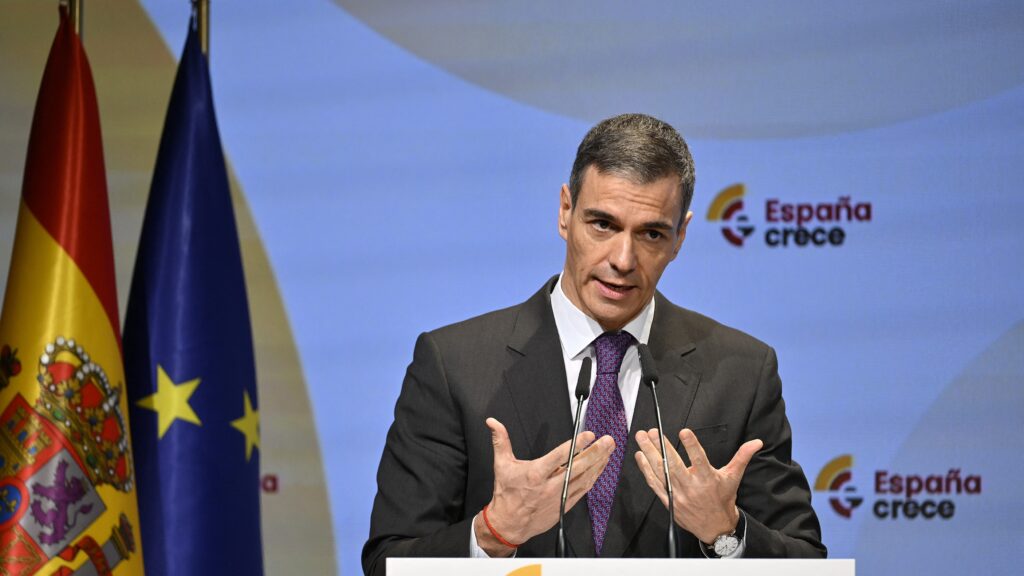The immigration debate in Europe has hardened. In the United Kingdom, it has even created new political cleavages on the Right. The old Conservative–Labour divide has been eclipsed by a split within conservatism itself. For instance, between Nigel Farage’s Reform UK, which adopts a relatively softer stance—surprisingly enough—and Ben Habib’s Advance UK, which calls for an uncompromising clampdown on immigration. What began as a national debate has metastasized into an internal struggle over the soul of the Right.
Spain is moving along a similar path. Immigration is no longer just a line dividing Left and Right, but increasingly one that runs through the Right itself. The numbers that frame the discussion are sobering. Spain, with approximately 49 million inhabitants, has the lowest fertility rate in Europe, at 1.12 children per woman—if counting native women alone, it would decrease to 0.9 children per woman. The outcome is already written: by 2050, Spain’s population will fall to 40 million; by 2100, it will be closer to 20 million; and by 2125, it could shrink to fewer than 10 million. In other words, in the space of three generations, Spain risks losing 80 per cent of its people.
No Western country has found a lasting way out of demographic winter. France, once considered the European model for its family-friendly cultural and social policies, has nonetheless seen a decline from 2.0 children per woman in 2010 to around 1.7 in 2023. Sweden and the Nordic countries, long heralded as champions of work–life balance and gender equality, are following the same path: Sweden has dropped from 1.9 in 2010 to 1.5 in 2023.
‘Fertility rose from 1.23 in 2011 to a peak of 1.55 in 2021, only to fall again…Hungary has slowed the decline, but not reversed it’
Not even Hungary’s massive undertaking on family policy—its so-called ‘pro-natalist arsenal’ of tax exemptions, direct subsidies, forgivable mortgage loans tied to childbearing, and work–family reconciliation measures—has been able to correct course. Fertility rose from 1.23 in 2011 to a peak of 1.55 in 2021, only to fall again to around 1.49 by 2023. Hungary has slowed the decline, but not reversed it.
Beyond Europe, the picture is even starker. South Korea has fallen to a record-low 0.7 fertility rate, while Japan hovers near 1.2. Despite enormous public spending, neither has succeeded in changing course. Demography cannot be bribed. At root, fertility is a civilizational choice, not an economic calculation.
This reality has always intersected with politics in Spain in a distinctive way. Vox has long emphasized a preference for migrants from Latin America over those from the Maghreb, the Sahel, or Sub-Saharan Africa—invoking the bonds of Hispanidad in language, faith, and shared history. The Popular Party (PP), more welcoming to immigration in general, on economic arguments such as labour force and welfare system replacement, has also leaned on the same idea, particularly in Madrid. Its president, Isabel Díaz Ayuso, has openly declared her ambition to make Madrid the ‘capital of Hispanidad’, supplanting Miami as the global hub of Hispanic business and culture.
Yet in recent months, something has shifted. Among Vox’s voter base—not so much its leadership—there is growing impatience with distinctions. What was once a nuanced preference for Hispanic American immigrants has hardened into a tabula rasa rejection of immigration: illegal, mass, or in some cases even legal migration. Here, Spain mirrors the UK dynamic, where a harder line is emerging from within the Right itself, potentially fracturing movements that once claimed to speak with unity.
‘Demography cannot be bribed’
However, Spain is in a uniquely fragile position to indulge in this absolutism. Without immigration, its collapse is a certainty. And unlike most European nations, Spain has a civilizational reservoir of more than 500 million people across the Atlantic who share its language and values. To strengthen those bonds is not charity—it is a matter of survival. Hispanic America is not a foreign world, but an extension of Spain itself.
This does not mean surrendering order or sovereignty. Immigration must be lawful, selective, and aligned with Spain’s needs. Professional competence is indispensable, as is cultural affinity. Assimilation cannot be optional: mastery of the language, fulfilment of civic duties, and adherence to shared values must be enforced without hesitation. Questions of nationality or political rights come last, well after job-based visas and demonstrable contribution.
History is clear: civilizations rise and fall. The Romans, Visigoths, Moors, and even the Spanish Empire itself all disappeared. Spain is not immune. Unless it rediscovers fertility from within—in what should be referred to as a civilizational miracle—or it embraces the ‘Empire Strikes Back’ dynamic—drawing strength from its Hispanic relatives—it risks a slow fading into silence. The choice is legitimate. And both have profound consequences.
Related articles:







